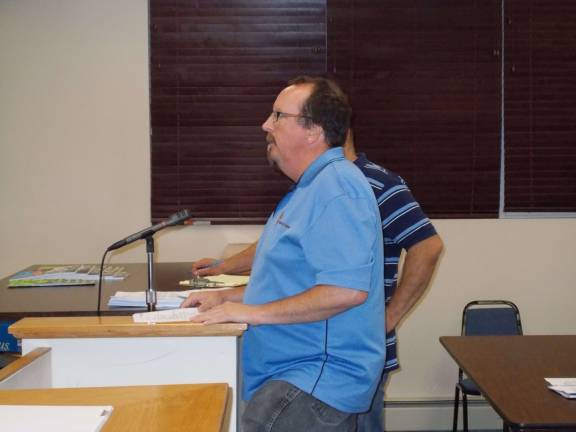DEP mandates Sussex water plant always be operating

SUSSEX BOROUGH — The state Department of Environmental Protection recently mandated that the Sussex Water Treatment plant run at all times.
The water plant was recently shut down on July 4 due to excessive turbidity — the cloudiness resulting from dirt spiking up in the water. After 3.3 inches of rain fell on July 3, the turbidity shot up to 125 Nephelometric Turbidity Univts.
Normally, the turbidity levels remain around 3-4 NTUs, with the cartridge cleaned NTUs after high turbidity below 20–30.
The atmosphere became tense at times between Furrey and the council. Both expressed frustration at the human error which caused the plant to shut down and the long, expensive list of improvements still needed for the plant.
Council President Marina Krynicky asked Furrey why the filters — the council spent $43,000 for a cartridge filter system on Dec. 17 — were not turned on.
Furrey said the plant did not have replacement cartridges because they had been used and were on back order. Instead, they used previously cleaned cartridges.
Councilwoman Linda Masson asked about the alarms used in order to avoid having an operator on site 24/7.
The council had spent $4,500 on a 32-channel solution alarm system to notify the water operator of problems, including high turbidity, on May 20.
Furrey said the alarms were replaced one week earlier.
Also, an operator received an alarm at 1 a.m. of overages in turbidity, but ignored it. Thus, the turbidity response was delayed. Furrey said he suspended the operator.
On top of the human error, the controls were affected by interrupted power and severe lightning. In response, Furrey called a programmable logic controller engineer to review the control system and computer alarms for three days. He is now confident everything functions properly and will prove to the DEP that the system is completely automated.
At the next meeting there will be a retroactive emergency order of under $8,000 to pay for the engineer.
Furrey gave the latest report to the DEP on July 14th and has not received an answer.
In order to comply with the new 24/7 mandate, Agra Environmental will amend its hourly charge from $75 to $50, for the extra 16 hours per day now needed. As of July 15, the borough will pay an unexpected $800, ever increasing until the mandate is resolved.
Furrey brought up again the need to dredge the Colesville Reservoir or remove the intake. He also said that the Colesville Reservoir quality has decreased because of increased: turbidity, organic matter, and significant amounts of bacteria.
Mayor Jonathan Rose said that there is a side stream which causes the turbidity. Furrey said the dredging quote for about 1/3 of the reservoir would be $30,000 to $40,000. Rose clarified that would be for 40 cubic feet of the reservoir. He also observed that possible dredging would be “intimately tied with the dam.”